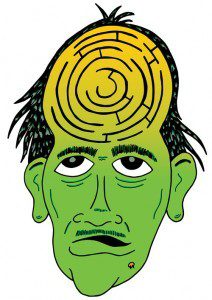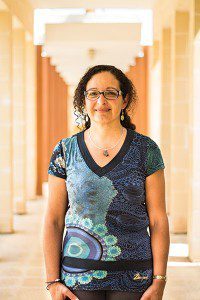 Gone are the days when learning a new language meant sitting in a classroom, reading books and practising with classmates. There are language learning apps, programs and games now. But can we really learn a new language just by using this technology? Veronica Stivala finds out. Illustrations by NO MAD.
Gone are the days when learning a new language meant sitting in a classroom, reading books and practising with classmates. There are language learning apps, programs and games now. But can we really learn a new language just by using this technology? Veronica Stivala finds out. Illustrations by NO MAD.
I recently needed to learn German. Barely familiar with basics such as ‘Please’ and ‘Thank you’ I had to start from scratch. I made use of diverse tools and techniques to learn a language that Mark Twain famously said causes ‘great distress to a new student’.
To overcome this suffering, I signed up to a Goethe Institute course in Malta, followed by private lessons, another course in Germany, and numerous books. I also used modern tools and the online language learning project Rosetta Stone and downloaded several apps to learn a new language quickly. Then I tried speaking to my German boyfriend in his native language and failed miserably. Thankfully he speaks English.
All of these methods did help me advance. However, can an adult learn a new language entirely through the use of technology, be it websites, games, or apps? The reason behind this question is simple. An all-app approach is convenient. You can learn anywhere and at any time. The technology lets you advance quicker than in group lessons and at your own pace, and is also cheaper whether you pay for the apps or not.
So I set out to discover whether an adult can really learn a new language from scratch, entirely through technology. The task was more complicated than I thought. I had been making many assumptions about what knowing a language actually means.
 It’s complicated
It’s complicated
The first hurdle was to answer the question ‘What does speaking a language well mean?’ As adults, we each have our own way of speaking our native language, which depends on our level of education and individual characters. Who qualifies as a good speaker of a language? The Queen for English, Goethe for German, Proust for French?
Psycholinguist W. J. M. Levelt takes this further and says, ‘adult native speakers differ with respect to communicative success when they speak. Some speak slowly, others fast; some articulate poorly, others well; the speech of some is characterised by a high incidence of short utterances, false starts, and self corrections, the speech of others is characterised by long and flawless utterances.’ But, essentially, regardless of our knowledge of our native language, it is that language which ultimately remains as our first, and best, language. This is also called our ‘dominant’ language.
For this we need to point out that there are people who speak a language, but who do not know how to write or read it. This automatically implies that knowing a language does not necessarily mean having all the language skills. Not every app and game covers all of these skills. Dr Alexandra Vella (Institute of Linguistics, University of Malta) points out that ‘different learners have different needs; so whether one needs all the language skills is something individual’. However, she continues, ‘even assuming one only needs to be able to use a language through speaking, isn’t it always the case that if you can read’ a language then you can get hold of more information than you would if you could not read?
“Language is made richer, and its status as a vehicle through which culture is transmitted grows because of its literature.”
Language is made richer, and its status as a vehicle through which culture is transmitted grows because of its

literature. As Edward Sapir says, ‘language is the medium of literature as marble or bronze or clay are the materials of the sculptor. Since every language has its distinctive peculiarities, the innate formal limitations—and possibilities—of one literature are never quite the same as those of another.’ So one could say that a corollary to this is that if one wants to learn a language in depth, then one needs to be able to read, and to write, and to learn its literature. The latter is most definitely something one needs to do alone, and outside an app or game.
A word needs to be said about one’s native language, and indeed, about the process in which we acquire this language also known as First Language Acquisition (FLA). Learning a language as a child and as an adult (New Language Acquisition, NLA) are so different that they are sometimes treated as two distinct phenomena. As children we learn and become fluent in a language without being aware of the process. On the other hand, when we try to learn a language as adults we are conscious of the learning process and do not always become fluent in it.
Making a language
So what is a language? Dr Vella talks about definitions. Does a secret language (such as Pig Latin in which words in English are altered) count? For the sake of this article I took language to be ‘a system of communication used by a particular country or community’, as defined in the Oxford Dictionary.
Another important factor is whether different languages are harder to learn. Dr Vella says this is not an easy question to answer because language learning takes place in a context, such as a classroom, and feeds into learners’ backgrounds, learning styles, and so on. Different teachers and schools adopt different teaching approaches. ‘Clearly, different methods work better for some learners as compared to others. The communicative method works best for some people by emphasising interaction as both the means and the ultimate study goal. It can produce relatively ‘instant’ results at the first learning stages. After only a few lessons speakers can introduce themselves and say basic phrases. Beyond the beginner stage other methods may be needed, but methods are not always adapted by teachers as they should be.
The ability to learn a language through games and apps is a tricky statement to answer. Though one can learn some language elements—vocabulary, phrases, pronunciation—through apps. The technology boosts learning when coupled with visual and auditory stimulation. But because the medium is still so new, there is not enough research to back up this statement.
TV seems to help. Some research shows that pupils who watched Italian television were just as good or even better than pupils learning Italian only in school. TV accesses both visual and auditory senses (primary listening skills) which is different to games and apps since they also access reading and writing (secondary skills). Games and apps should be better.
A case study
I spoke to David Cabrera Sánchez, a native bilingual of Spanish and Catalan who recently learnt Maltese. Being bilingual possibly helped since his brain was already attuned to handling more than one language at a time. Also, Spanish and Catalan share many characteristics with other languages he has learned. He knows Arabic and Italian that helped him learn Maltese. He was also highly motivated as Maltese is required for his work as an interpreter. And indeed this is the main caveat since he needed a deep understanding of the language, including its culture, because of his job: his ultimate aim.

Since he was living in Paris, the Internet was his main learning tool. He downloaded articles and podcasts. ‘If I hadn’t had an internet connection, a computer or a mobile phone, I wouldn’t have been able to learn Maltese outside of the Maltese Islands,’ he says. He also only managed to find a tutor in Malta and had lessons over Skype. But Cabrera Sánchez only managed to really learn Maltese when he finally came to the island to do a course.
Technology and will power are simply not enough. Cabrera Sánchez pointed out that ‘people have been learning languages for ages without any sort of technology [and] it is only by living in the country that you can get to know its culture, people, and traditions. Something which is of vital importance for interpreters’.
“It is only by living in the country that you can get to know its culture, people, and traditions. Something which is of vital importance for interpreters.”
A game
The Institute of Digital Games (University of Malta) recently developed a game called Words Matter for language-learning for dyslexic people. It is aimed at young children, however adults can also enjoy it.
I ask Prof. Georgios N. Yannakakis, the brains behind the game, whether he thinks using games is a faster, alternative and/or supplementary way to learning a language. His answer is a most definite ‘yes’. ‘The association is rather clear, in my opinion, as games can provide great means for enhanced learning. The important element here is “enhanced learning”. In other words, I would conclude that using apps and games is a means to “support” (or, the more modern term, to “scaffold”) language learning.’
While learning a language always requires some degree of repetition, this is heightened with dyslexic learners. In this game, within the different teaching strategies for literacy aimed at students with dyslexia, ‘overlearning’ is always given a top priority. This technique means the student regularly repeats the same activities or exercises in order to acquire and maintain skills recently acquired, as this is viewed as contributing towards gains in speed and accuracy with regards to literacy skills. ‘In light of how players are typically expected to learn core mechanics and apply them repeatedly, digital games offer considerable potential as part of dyslexia interventions. In addition, a well-designed and rich game can keep a student engaged while working on educational activities, and even motivate them to work on them outside school hours.’
So what is the best way to learn a language?
Vella says the ideal way of learning a language is to start with a solid ‘language base’. A learner needs to conceptually (syntax, phonetics, and vocabulary) understand the language and have a solid knowledge of grammar. Coupled to this, learners need to be immersed into situations that require them to use their language skills in the real world. Young learners do this naturally: they first acquire the language base ‘passively’ and then, little by little, start to experiment with ‘actively’ using this language base.
“A learner needs to conceptually understand the language and have a solid knowledge of grammar (syntax, phonetics, and vocabulary).”
From my end, my German still leaves much to be desired. I saw the biggest improvement when I attended an immersive course in Germany, where I had to speak German because English was not widely used. These pressures helped improve my German considerably in just a week. That said, I still remember certain phrases and basic vocabulary I learnt through Rosetta Stone and Memrise, mostly because of the visual cues and humour they use. So technology did help, but as a supplementary medium rather than as the one and only way for language learning. Games, programs, and apps most definitely help and speed up language learning but till now there isn’t an app for that.
Some language learning apps and programs
DUOLINGO
Reading, writing, listening, and speaking skills are split into bite size skills such as numbers, nature, and adjectives that feel like games. You lose a life when you get something wrong and you earn points when you complete a lesson.
MEMRISE
A fun app with game elements and which adapts to your personal learning style and performance. You are taught vocabulary and phrases through auditory and visual cues, often funny ones. The competitive element—you gain points and can compete with friends —further encourages learning.
ROSETTA STONE
A reputable online language learning project. While I did learn vocabulary and elements of grammar such as the gender of nouns, I found myself wishing I knew the rules behind the new things I was learning.
WAITCHATTER
This is an extension to Google Chat where new words pop up beneath the chat window while you are waiting for your buddy to reply to your message. The program is essentially a vocabulary teacher, currently only available for French and Spanish. During casual instant messaging users learnt 57 words in two weeks, an average of four words a day.
Further reading
-
Al Ghazali, F. (2006). First Language Acquisition VS Second Language Learning: What is the difference?. Birmingham: University of Birmingham, The Centre for English Language Studies.
-
Caruana, S. (2009). ‘‘The Italian Job’: the impact of input from television on language learning’ in Exploring the Maltese Media Landscape, eds. J. Borg, M. Lauri & A. Hillman. Valletta: Allied Newspapers, pp. 173-185.
-
Cuschieri, T., Khaled, R., Farrugia, V. E., Martinez, H. P., & Yannakakis, G. N. (2014, September). ‘The iLearnRW Game: Support for Students with Dyslexia in Class and at Home’. In Games and Virtual Worlds for Serious Applications (VS-GAMES), 2014 6th International Conference, pp. 1-2. IEEE.
-
Levelt, W. J. M. (1989). Speaking: From intention to articulation. Cambridge, Mass.: MIT Press.
-
Oxford, R. L. (1990). Language Learning Strategies: What every teacher should know. Boston: Heinle and Heinle.
-
Sapir, E. (1921). Language: An introduction to the study of speech. New York: Harcourt, Brace and company.






Comments are closed for this article!